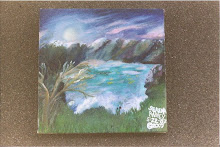Is it going to be English? Not if the English-speaking countries don't start remembering what words mean long enough to communicate. Will it be Spanish? Maybe. Arabic? Could be. Mandarin Chinese? Perhaps, but Westerners would have a hard time learning it. Or will some dark horse run out and take the blue ribbon? Everyone wants to know what the last language alive will be.
But why should we let any of them die? Four hundred languages lived side-by-side in the Americas five hundred years ago. A thousand years ago, Europe and Western Asia were equally polyglot. Africa, too, has many tongues, each unique, irreplaceable. Eastern Asia and the Pacific have their hundreds and the Southern Sea has its own indigenous languages as well. Listen to one next time you watch a travel show. Listen beyond the voice-over, to the beat, the thrums and trills of another way of making sense, and tell me if you're hooked. I dance to language. I slip it through my fingers like a harp string when I go to sleep and feel it vibrate against my hand like a drum skin when I wake. Never throw away a language. If you don't have room for the whole thing, cut a piece and stitch it into a quilt with your old one; use it as a patch. Take at least a hundred words. Take a way of ordering words, it doesn't take up any room. Learn the African language Shona or Xosa, Luganda or that big crazy-quilt, Swahili. Learn the European tongues: Magyar, Euskari, Italian, Finnish, Polish, Irish, Welsh, Catalan. Pick up something from Asia: Why not Vietnamese or Thai, Hmong or Tibetan or any bit of the patchwork that is India. How about some Hindi? Keep a bit of real early America alive in your head -- study Hopi, Apache, Inuit, Cherokee, which has an alphabet of its own, or Creek. Maybe you'll fall in love with something else: Maori or Tagalog, Incan or Samoan or Hawaiian....There are three thousand languages officially living, but they die for lack of a home.
Learning new ways of doing things and remembering words are two of the ways neuroscientists say you can prevent Alzheimer's before it starts, and slow it or even reverse it once it sets in. Learning a language fills both those needs.
Additionally, a language is a way of perceiving the world. In French, there are two ways of saying, "I love you." One means something like "I like you." The other means "I adore you." Neither would mean the same thing with the formal/plural "you".
If you want to say you like someone and want it to be clear you aren't in love, you say, "I like you plenty." Spanish is similar. The meaning of liking and loving people thus has specific degrees and kinds, each with a name. In Spanish, animals' legs aren't legs. The parts of animals have animal words to describe them, unlike human appendages. In English, we accept animals as part of the family, with the same names and the same limbs; they are almost our relatives. But in Spanish, animals are little like us. One doesn't even use the same hand position to indicate the height of a human, of an animal and of an inanimate object. The language reflects, affects and maintains the unique cultural attitude to other creatures.
In Hmong, there are no plurals nor verb tenses. Context tells the hearer whether the speaker sees a house now, saw one at another time, expects to see one under other conditions, sees the house, rather than a house, or a few houses. In that language, to leave the context out is to leave the hearer out of the picture. When a language dies, a way of thinking dies, and with it, a whole world.
Pick one up today. Keep it alive. It just might do the same for your brain -- and your heart.
Monday, May 5, 2008
Subscribe to:
Posts (Atom)




